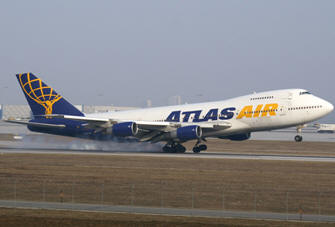|
|||||||||||||||||
|
|
|
|||
|
Atlas And Polar Air Cargo Pilots To Receive
Groundbreaking Contract By Eddy Metcalf |
||||
 |
April 26, 2011 - It’s been slightly over two years since the pilots and flight engineers of Atlas Air and Polar Air Cargo, (AAWW) voted to leave another pilot union to join the Teamsters Airline Division.
This week, they began briefings on what eluded them for
years with their previous union and led to their joining
the Airline Division. Something they have now
accomplished with the Teamsters; the joint collective
bargaining agreement. While the three sections awaiting the ruling of a Federal arbitrator are expected shortly, the negotiating committee and members of the Executive Council conducted a crewmember meeting describing the highlights of the new SCBA in Miami this past week. |
|||
|
Committee Chairman Captain Bob Ulrich presented to the
crewmembers what can be described by any critical measure as a
game changing contract in an industry where pilots have suffered
devastating losses in pay, pensions, benefits and changes in
work rules that have eroded their quality of life in recent
years. The new contract now places the crewmembers of the new
combined unit; known as Atlas Air Worldwide, on par with the pay
and benefits of many “legacy” passenger airlines, who have long
been considered the “gold standard.”
In addition to hourly rate pay raises averaging 30% for Polar
and 14% for Atlas that brings the two groups to parity; work
rule changes over the current working agreements can yield a
monthly increase of up to a 41% for Atlas crewmembers and a
50%for Polar crewmembers, when compared to similar flying
conducted under the old work rules.
Travel, long a concern for the crews who operate around the
world on very difficult schedules was also extensively improved,
allowing crews the ability to get home in an expedited manner
after they have completed their trip. Additionally, improvements
on the number of days of vacation, additional medical disability
coverage, an expedited grievance process with the union control
of the docket, and a 10.5 million dollar signing bonus are some
of the additional improvements in the agreement. Profit sharing is also extended to the Polar crews in the agreement as well. In March, the Atlas crewmembers received profit sharing calculated at 20.1% of their past years W-2 salary. “When we began this process two years ago, Airline Division Director David Bourne promised our pilots and the negotiating committee that while the decisions were ours to make, he would be there to fully support us as we moved forward,” said Ulrich. “He delivered on that promise with the Airline Division, and with the entire International offering us tremendous support. |
||||
|
“It was because of Dave’s support that we were able to bring in Captain Rick Dubinsky as our professional negotiator. Ricks expertise, which was responsible for negotiating the biggest airline pilot contract in history at United Airlines, was critical to our success. We were also able to have with us John Wentz, the outside legal counsel for the Airline Division and Local 1224 as our lead legal counsel. "His expertise in writing the language of the new SCBA was invaluable in ensuring the language of our contract was written in a way that provides us the strongest leverage possible should we ever need to go to arbitration on an issue. "When
it came to scope; one of the most critical areas of the contract,
when we asked Captain Bourne for his thoughts, he suggested we talk to
Roland Wilder, who is recognized as the best attorney in the country on
Scope language to ensure we have the strongest scope language possible.
Our decision to bring him aboard gave us a tremendous team at the
table,” Ulrich continued.
Additionally, we had help from Airline Division Representative Scott
Hegland. Crewmember negotiators were Polar Captain Dan Wells who was on
the former Polar Negotiating Committee Chairman, Atlas First Officer
Paul Kvernplassen and Atlas Captain Bill Holcomb who was on the Scope
subcommittee with Dan Wells. The make-up of this Negotiating Team is
what made our outcome possible. “One thing that became readily apparent as we proceeded was the tremendous disadvantage our previous Atlas Air union leadership and negotiating team were under from the first contract. They inherited a flawed document that had been rejected by the members and were given very little opportunity by the NMB and our previous national union to do anything but make just enough structural changes to get it ratified,” Ulrich said.
“In the years that followed, they tried everything they could to make
more changes and they deserve credit for their tireless efforts. |
|
|
| ©AvStop
Online Magazine
Contact
Us
Return To News
|
|

